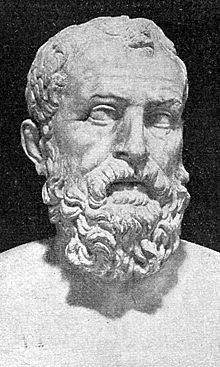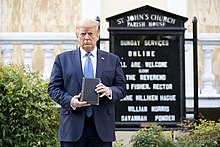Ruler
Appearance
(Redirected from Ruling)




A ruler is a person who exercises dominion or power over others.
Quotes
[edit]- The people ... have a right, an indisputable, unalienable, indefeasible, divine right to that most dreaded and envied kind of knowledge, I mean, of the characters and conduct of their rulers.
- John Adams, A Dissertation on the Canon and Feudal Law (1765)
- …He is a weak ruler who needs religion to uphold his government; it is as if he would catch his people in a trap. My people are going to learn the principles of democracy, the dictates of truth and the teachings of science. Superstition must go. Let them worship as they will; every man can follow his own conscience, provided it does not interfere with sane reason or bid him against the liberty of his fellow-men.
- Mustafa Kemal Atatürk, as quoted in Atatürk: The Biography of the founder of Modern Turkey, by Andrew Mango; "In a book published in 1928, Grace Ellison quotes [Atatürk], presumably in 1926-27", Grace Ellison Turkey Today (London: Hutchinson, 1928)
- Virgin Justice, Zeus' own daughter,
Honored and revered among the Olympian gods ...
Sits down by the Son of Kronos, her father,
And speaks to him about men's unjust hearts
Until the people pay for their foolhardy rulers'
Unjust verdicts and biased decisions.
Guard against this, you bribe-eating lords.
Judge rightly. Forget your crooked deals.- Hesiod, Works and Days, as translated by Stanley Lombardo
- Nothing appears more surprising to those, who consider human affairs with a philosophical eye, than the easiness with which the many are governed by the few; and the implicit submission, with which men resign their own sentiments and passions to those of their rulers.
- David Hume, “Of the First Principles of Government,” in Essays, Literary, Moral and Political, p. 32
- They don't really care about us.
- Sed quis custodiet ipsos custodes?
- But who will guard the guards themselves?
- Juvenal, Satire VI, line 347
- But who will guard the guards themselves?
- If the proverbial man of the planet Mars would come to this earth and inquire about the difference between "leader" and "ruler" he would learn that "rulers" are strange people who dressed in ermine, wore crowns, married foreign women, kept strictly to themselves, and had the inclination to administer the country without asking the people about their wishes. A "leader," on the other hand, he would be told, is a regular fellow in a simple uniform who embodies his nation, who tries desperately to create by propaganda complete unison between his ideas and the people. A leader, he might hear, was a local boy who made good, who spoke everybody's language, who never traveled abroad and disliked titles and royal paraphernalia.
- Erik von Kuehnelt-Leddihn, The Menace of the Herd (1943), p. 313
- The master’s tools will never dismantle the master’s house. They may allow us temporarily to beat him at his own game, but they will never enable us to bring about genuine change.
- Audre Lorde, Sister Outsider: Essays and Speeches. Crossing Press. 1984. p. 112. ISBN 978-0-89594-142-8.
- ... the rulers of this age, who are coming to nothing.
- We wrestle not against flesh and blood, but against principalities, against powers, against the rulers of the darkness of this world, against spiritual wickedness in high places.
- New Testament, Paul of Tarsus' Ephesians 6:12 KJV
- The rulers wanted to fool people, since they saw that people have a kinship with what is truly good. They took the names of the good and assigned them to what is not good, to fool people with names and link the names to what is not good. So, as if they were doing people a favor, they took names from what is not good and transferred them to the good, in their own way of thinking. For they wished to take free people and enslave them forever.
- The Gospel of Philip, as translated by M. Meyer, in The Nag Hammadi Scriptures (2007), p. 163
- There is no one who ever acts honestly in the administration of States, nor any helper who will save any one who maintains the cause of the just.
- Plato, The Republic, 496d
- The absolute ruler may be a Nero, but he is sometimes a Titus or Marc Aurelius; the people is often Nero, but never Marc Aurelius.
- Antoine de Rivarol, quoted by Erik von Kuehnelt-Leddihn in The Menace of the Herd (1943), p. 103
- Tout institution qui ne suppose pas le peuple bon et le magistrat corruptible est vicieuse.
- Any institution which does not suppose the people are good, and the magistrate is corruptible, is evil.
- Maximilien Robespierre, Déclaration des droits de l'homme et du citoyen, Article 19 (1793)
- Ars prima regni posse te invidiam pati.
- The first art to be learned by a ruler is to endure envy.
- Seneca the Younger, Hercules Furens, CCCLIII.
- “Will no one rid me of this meddlesome priest?” asked Henry II as he instigated the murder of the Archbishop of Canterbury, Thomas Becket, in 1170. Down through the ages, presidents and princes around the world have been murderers and accessories to murder, as the great Harvard sociologist Pitirim Sorokin and Walter Lunden documented in statistical detail in their masterwork Power and Morality. One of their main findings was that the behavior of ruling groups tends to be more criminal and amoral than that of the people over whom they rule.
- Jeffrey David Sachs, "Killer Politicians," Project Syndicate, Oct 24, 2018
- You made your rulers mighty, gave them guards,
So now you groan 'neath slavery's heavy rod.- Solon of Athens, as reported by Diogenes Laërtius (trans. C. D. Yonge) The Lives and Opinions of Eminent Philosophers (1853), "Solon", sect. 5, p. 25.
- It is, indeed, a vice of rulers that men who have exceptional ability and worth are offensive to them, since they whose greatness is due to their position find it difficult to love those whom inner power makes great.
- John Lancaster Spalding, Aphorisms and Reflections, p. 81
- שָׂרַ֣יִךְ סֹורְרִ֗ים וְחַבְרֵי֙ גַּנָּבִ֔ים כֻּלֹּו֙ אֹהֵ֣ב שֹׁ֔חַד וְרֹדֵ֖ף שַׁלְמֹנִ֑ים יָתֹום֙ לֹ֣א יִשְׁפֹּ֔טוּ וְרִ֥יב אַלְמָנָ֖ה לֹֽא־יָבֹ֥וא אֲלֵיהֶֽם׃ פ
- Tanakh, Nevi'im, Isaiah 1:23, Leningrad Codex.
- Your rulers are rebels, partners with thieves; they all love bribes and chase after gifts. They do not defend the cause of the fatherless; the widow's case does not come before them.
- שָׂרֶ֣יהָ בְקִרְבָּ֔הּ כִּזְאֵבִ֖ים טֹ֣רְפֵי טָ֑רֶף לִשְׁפָּךְ־דָּם֙ לְאַבֵּ֣ד נְפָשֹׁ֔ות לְמַ֖עַן בְּצֹ֥עַ בָּֽצַע׃
- Tanakh, Nevi'im, Ezekiel 22:27, Leningrad Codex.
- Her princes in her midst are like wolves tearing the prey, to shed blood, and to destroy souls, to get dishonest gain.
- I do not want to be a ruler; I am not anxious to be rich; I decline military command; I detest sexual promiscuity; I am not impelled by any insatiable love of money to go to sea; I do not contend for reputation; I am free from an insane thirst for fame. ... Why are you “destined” so often to grasp for things, and often to die? Die to the world, repudiating the insanity that pervades it. Live to God, and by apprehending God, apprehend your own nature as a spiritual being created in his image.
- Tatian, Address to the Greeks, Chapter 11
- Your rulers and your dignitaries are those who are clad in plush garments, and they shall not be able to recognize the truth.
- What the master giveth, the master can take away.
- Kwame Ture and Charles V. Hamilton, Black Power: The Politics of Liberation in America. Vintage Books. 1967. p. 101. ISBN 978-0-394-70033-5.
See also
[edit]- Authority
- Despot
- Dictator
- Government
- King
- Leadership
- Legislators
- Obedience
- Politicians
- President
- Prince
- Queen
- Ruling class
- Tyrant



